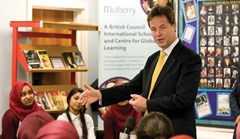Policy innovations
 agendaNi considers local educational policies which have learnt from the successes of other countries and regions.
agendaNi considers local educational policies which have learnt from the successes of other countries and regions.
Northern Ireland parties tend to fight traditional battles over education at election time but, in recent years, manifestos and policy papers have started to show fresh thinking and draw on examples of good practice from further afield.
The UUP has proposed a pupil bonus scheme (similar to the pupil premium in England) which would give schools extra funding, based principally on how many children qualify for free school meals. The policy was suggested in last year’s policy review and the extra money “will be left at the discretion of individual principals to spend on what they deem most pressing.”
Ulster Unionist spokesman Danny Kinahan has suggested the renaming of free school meals to ‘healthy eating vouchers’ as the name can embarrass parents who are considering whether to apply for the scheme. The pupil premium (a Liberal Democrat commitment) was introduced in England in April 2011 and allows for an extra £900 per eligible pupil. Lib Dem backbencher Nick Harvey has been critical as the policy widens the gap between the poorest and richest education authorities. He points out that his constituency of North Devon has pockets of deprivation which are ignored due to the area’s generally prosperous image.
In a 2009 policy paper, ‘Making Devolution Work’, the SDLP commended Finland’s example in abolishing academic selection. The Scandinavian state had the highest European performance in that year’s OCED Programme for International Student Assessment. However, the party also pointed out that Finnish reforms involved a 30-year reform programme from 1963 onwards. The SDLP believed that reform in Northern Ireland could be achieved in a shorter timescale but only if there was political will to agree on a compromise.
The DUP general election manifesto calls for ‘child-parent centres’ based on a model used in Chicago to be piloted in cities in Great Britain. The manifesto explained: “The guiding principle of the Chicago programme is that by providing a stable pre-school learning environment, in which parents are active and consistent participants in their child’s education, success at school will follow.”
DUP representatives have not mentioned the project in Parliament or in the Assembly since 2010. However, they have emphasised the value of other early intervention projects, especially those which focus on good parenting.
Sinn Féin’s education commitments are limited to eight brief points in the 2011 Assembly manifesto, which gives the party a scope to introduce a wide range of policies now that it has been returned to office. Its more detailed manifesto for Dáil Éireann proposed: a minimum of 150 school building projects per year; the creation of 500 new teaching posts; and reducing class sizes to 20 pupils per teacher.
If the party had repeated these commitments in the North, its freedom to implement them would be constrained by a decreasing budget. Northern class sizes tend to be relatively low due to falling pupil numbers e.g. 25.6 in nursery schools, 21.2 in primary schools and 15.2 in post-primary schools.
Alliance’s manifestos tend to focus on integration in education, making use of ideas within the province.





